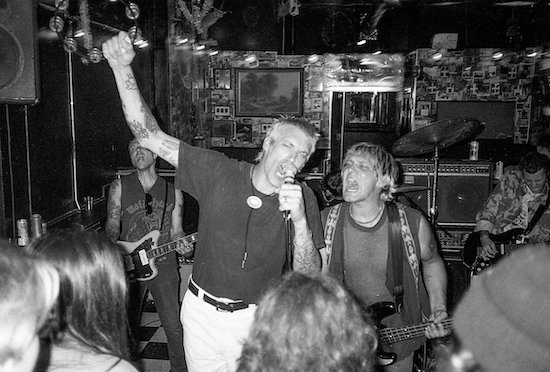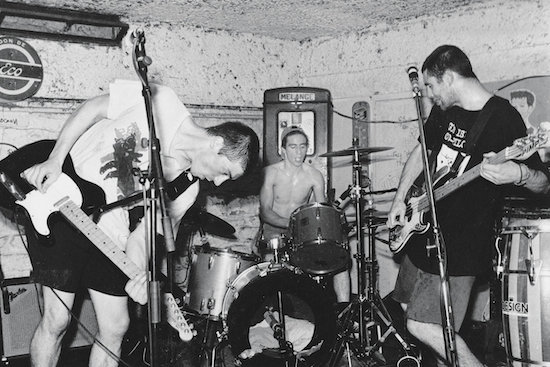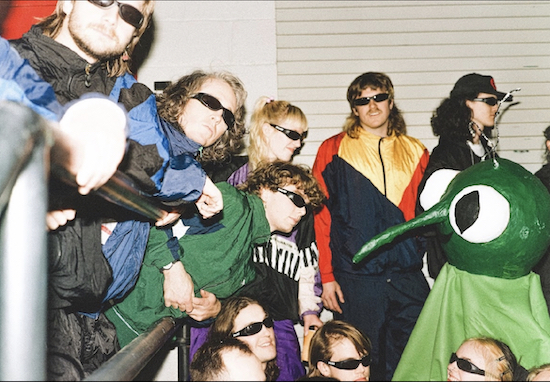What underground subculture are the weasels and ogres of Today’s Corporate Music Industry aiming to appropriate, infiltrate and exploit? You’ll have to be patient! Related: what underground subculture would you target thus, if you were one of the weasels? Me, I’d turn my sights on so-called ‘egg punk’ bands, figuring their popcentric leanings, good cheer and jaunty tempos could be manipulated to my own nefarious ends. And wouldn’t you know it, that’s what’s happened to Snõõper (pictured above), a pair of Nashville synth-stabbers beefed up to a quintet for their major label debut.
I am mostly goofin’ here: Third Man Records, who have released the Super Snõõper LP, are only ‘a major’ if you use the Maximum Rocknroll taxonomy (it’s distributed by a subsidiary of Sony), and I also doubt they have overly wild delusions about Snõõper’s commercial potential. It would however be cool if lots of people heard this, a 14-song, 23-minute album which re-records the lion’s share of their first two EPs.
Connor Cummins, who founded Snõõper some three years ago with vocalist Blair Tramel, has featured in Straight Hedge before as Spodee Boy; new guitarist Ian Teeple with Kansas City’s frazzling Warm Bodies. Super Snõõper has those acts’ spirit, speed and fidelity at points, but is geekier and gawkier, Cummins and Teeple tuning their guitars to some kind of a wild-pitched rockabilly setting and Tramel leaning hard into the ‘earnest rube utterly confused by the modern world’ lyrical act.
“Sort of egghead egg punk” is what I wrote by Landowner’s name, in the course of compiling this column. Reductive shorthand I couldn’t shake, as a descriptor of this Holyoke, MA band’s fourth album Escape The Compound (Born Yesterday). Guitars wirier than an Airedale terrier, vocals in the Jello Biafra/Mark Mothersbaugh/Sam McPheeters tradition of appalled haughtiness, unorthodox and somewhat mathematical arrangements: if only one person in the world wants an album sitting in the midpoint between Uranium Club and Horse Lords, that person is me.
Landowner was founded by Dan Shaw, recording one album solo before recruiting four bandmates; on Escape The Compound, he’s credited with all the songwriting and none of the instrumental performance. If we then suppose the vocalist is a charismatic Ideas Man, it speaks well of Josh Daniel, Jeff Gilmartin, Elliot Hughes and Josh Owsley. ‘Witch Museum’ is a superb album opener, lyrically and musically: Shaw drags his children to a couple of in-state tourist attractions which, in highlighting man’s follies of yore (witch trials in Salem; whaling in New Bedford) invite us to believe we have evolved, ethically, as a species, despite the daily deluge of counter-evidence.
It’s fast and bassline-powered, demonstrative of Landowner’s punk tastes along with ‘Victim Of A Narcissist’s Tactics’ and the drum machine workout ‘Floodwatch’, which concludes the album. The title track is nearly eight minutes long but hardly indulgent in outlook, with a B-52s-on-45 burst in its middle, and ‘Slow Tactics’ makes a capable fist of the Louisville post-rock sound.
I’ve grown very sweet on this album by Parallel Worlds, a quintet from Yorkshire making a quasi-debut with In The Comet’s Path – released on Bandcamp early this year and now available on vinyl through the Scene Report label. That ‘quasi’ is there because this band are a partially modified version of another one, Young Conservatives, with an extra member (second guitarist Joe Osborne) and a more expansive sound than their previous, melodic bent. Parallel Worlds are neither conservative nor young, with drummer Dave Allen toiling in UKHC legends Voorhees over 30 years ago; other members came of DIY-scene age over the next decade, including bassist James Islip in Kill Yourself and singer Andy Bryant in Imbalance and The Horror.
Bryant’s vocals are a little less larynx-wrecking these days, though hardly a honeyed croon – a northern English spin on first wave emo and Damian Abraham of Fucked Up. That band’s early studio albums are a decent reference point for what Parallel Worlds lean towards here, as it goes, with psychedelia and post punk asserting themselves amidst a framework of pro-rocking hardcore: peep the guitar sound on the title track or ‘Down The Cut Blues’, and the rhythm section of ‘End Song’.
Gimic, from Bristol, started playing live maybe three and a half years ago, and have enhanced their operation vastly in that time: from “pretty cool, good to have a new band around that sounds like this” (their spring ‘20 demo tape) to “shit, this is some of the absolute best DIY punk in the UK, isn’t it” (their debut 7-inch Defer To Hate [Crew Cuts], which I am reviewing here). For all that, my (once again) reductive one-liner from when I first caught them – a Toxic State Records version of Nomeansno – has held fast, including on these five superb songs.
By no means maximalist or indulgent songwriters, you can pay specific attention to the sounds any of Gimic’s four members are making on Defer To Hate and hear something interesting. Rory Matthews and Lawottim Anywar are a wriggly-sick rhythm section, and a lot of the time you can wrap Rory Joseph into that too as he’s an intuitively rhythmic guitarist – though the miniature psych-punk firework detonations he drops into the title track, and the skatepunk-gone-metal solo on ‘Life Is A Race And The Price Is Death’, are a different kind of bonzer. Finally, Harriet Elder is a powerhouse vocalist, tempering boiling ire with something like amused detachment, and switching between a hardcore and grunge register on EP closer ‘Scrumper’.
In the one-man-band guise of Fashion Change, Seattleite Ryan Matthews has burped up a few tapes and one 7-inch already, so I’m slightly late to the party, but Iron Lung Records have been their normal reliable catalyst by releasing three new songs by him on a flexidisc 45. I say ‘him’, but supposedly this was recorded as a full band; I say ‘supposedly’ because I just read that on the Bandcamp page and don’t know who any of them are. Doesn’t seem like something there’d be much point saying if it wasn’t true.
Either way, ‘City Lights’ kicks off by pulling Fashion Change’s unfathomably agitated no-fi hardcore in two different directions: first a sludgy, crusty one with explosive downtuned riffs and death metal vocals, then – with no real warning – 40 seconds of surrealist jangly postpunk that could have been plucked from the early 90s Scottish underground scene. (Hold that thought!) ‘Smoking Kills’ retains the pukey vox, in amongst some yelled’n’reverbed ones, and gets plenty directional changes into its 64 seconds; ‘Sick’ has drum rolls for the ages and a mad-metal guitar solo that simply had to have been played with the axe held vertically.
This seven-track 7” by Barcelona’s Piñén bristles with almost inhuman force, but a very human(ist) empathy and belief in proletarian resistance. It’s titled in tribute to Nicolasa Quintremán, a Chilean woman who protested the construction of a hydroelectric dam which would displace her community, and who drowned in 2013 near the construction site. Biographical and media sources dutifully note both the official verdict of accidental death and the cloud of suspicion shrouding the incident: Piñén are less equivocal, with this EP’s opening song following archive interview dialogue (reprised for the final track also) by talking of murder, bloodstained hands and colonialism over full-speed-ahead rawpunk.
The earnest directness with which Piñén address their bêtes noires is a tonic. The lyrics are all in Spanish, but you shouldn’t need a tourist phrasebook-level familiarity to discern what ‘Contra El Feminismo Blanco’ is about, and subsequent broadsides against racist border controls and deportation polices, plus extinction-level environmental wrecking, reaffirm the band’s energy-as-anger. Piñén formed as a guitar/drums duo, and as far as I know (sans available credits) remain one, but in lieu of hard info, smash your head on the hissiest sounding cymbals you ever heard and hardcore pogo guitar in the rough orbit of bands like Ignorantes or long-gone Mexicans Xenofobia.
Another graduation to vinyl heralds a step into realms of excellence with Vedo La Tua Faccia Nei Giorni Di Pioggia, by Spirito Di Lupo of Milan/Bologna. Their 4 Canzoni tape from 2021 – released first through their own label/collective Sentiero Futuro Autoproduzioni, then via Iron Lung, who along with La Vida Es Un Mus are co-handling this follow-up album – was good, but in large part because of its ultra-anarcho crudity. This isn’t the case here, with SDL’s six members hammering away with a strange, alluring, elegant ire over 12 songs (two of which are labelled as interludes, with another originally released by Comunione, a recent solo project stemming from their Milanese scene).
Levels of slashing goth-rock gloom have been greatly increased, especially, and the group are dab hands at that uber-Banshees chorus pedal swirl sound. Vocals are shared between Francesco Goats and Vittoria Pugliese – when they double up lines, as on ‘Oltre Lo Sguardo’, it works a charm – and the rhythms split the difference between Mortarhate Records ratatat and dirgeful blackened streetpunk. Worth passingly adding that bassist Andrea Mantione also plays in Nuovo Testamento, whose recentish album is the best new italo shit I’ve heard in years. It may be that he would prefer to think of them as entirely distinct ventures, but both of these long players are built around hooks of improbable size and the arguably uncool but profound truth that ‘mid’ can be a highly effective pace.
Mad how calling your band ‘Motorbike’, as the band Motorbike from Cincinnati have done, is a heavily corny and uninspired gambit… except they are, as far as can be discerned with readily available info, the first band ever to use this name. Could this also mean that they play a powerfully established style of music, say garage-rockin’ postpunk of a late-70s flavour, and somehow – on their self-titled debut LP, released through Feel It – find a way to make that sound original too? What do you know!
Motorbike are a quintet of four Cincinnati-scene perennials plus vocalist Jamie Morrison, who hails from Swansea and has somehow ended up here. Dakota Carlyle and Philip Valois, the two guitarists, are a tidy tagteam given to a little 70s heartland rock indulgence, tonally speaking, though Motorbike is rarely less than economical when journeying from A to B. These nine songs can variously bring to mind UK originals (The Fall), US originals (Pere Ubu), US revivalists (Parquet Courts) or Aussie revivalists (Civic), with the odd motorik beat… but it all feels like Motorbike’s own thing, which counts for plenty in this game.

Summer 2023, and not only is John Hinckley Jr out of prison and free to fulfil one of his three biggest ambitions – releasing an album of lo-fi indie rock – a band who, notoriously, named themselves in tribute to his attempted presidential assassination, practically while the target was still on the operating table, are back with a new LP of their own. It’s the Long 80s – embrace it! Or don’t, but Last Ride (DC-Jam) by JFA, or Jodie Foster’s Army if you will, is some good craic which upholds the Phoenix band’s brand of hardcore eccentrica with unduly youthful energy for a band whose first single came out 42 years ago. (The current quartet feature two founder members, Brian Brannon and Don Redondo.)
Quick to expand their horizons after the lightning-fast tempo of that debut, with later JFA releases displaying surf, funk and psych influences, Last Ride mixes it up in a way fairly akin to where the band had ended up by about 1984. This being the band that made the links between skateboarding and punk rock their personal brand, to a greater extent than anyone before them, there’s songs called ‘Desert Pipes’, ‘Speed Wobble Blues’ and ‘Vert Soldier’, and those are pacey slammers to skate to. There’s also glam/garage keyboard parts, a 60s-style surf instrumental and, towards the end, a withering callout of the proverbial ‘Soccer Dad’ delivered as portentous folk-rock and with an airhorn at the end for some reason.
It’s pretty cool that a label from Melbourne, name of Sorcerer, has taken it upon themselves to compile everything recorded by Dawson, a Glaswegian band who operated in a niche of great energy and invention in the early 90s. They’ve done so using the reliable ‘compact disc’ format and are selling it for about £15, though this will no doubt disappoint those out there who wanted it as a vinyl box set for six times that price. As it is, here’s about two and a half impeccably uneven and borderline overwhelming hours of open-eared leftist post-hardcore surrealism.

Dawson
Precedents and antecedents for Dawson are apparent, but easy to overstate. Jer Reid’s guitar style is this extraordinary pecking, scratching metallic (not the genre) sound, like bugs on a hotplate, which you have a map reference for – but not a picture of the destination – if you’ve heard Trout Mask Replica and Minutemen and 80s highlife and bands released by Ron Johnson Records. The mean tempo is brisk, made to feel still more hectic by the instrumental babble and ranty vocals, although thrash-mode Dawson songs are interspersed with looser jams and the influence of dub. Save for the odd song titled something like ‘George Bush’s Family Oil Business’, you are unlikely to know what vocalists Reid and Ali Begbie are going on about most of the time – in-group references now lost to the ages, I expect – but it has the cadence of poetry, and the frothing conviction of street preaching.


